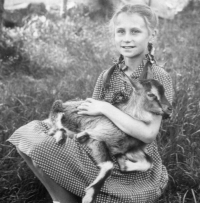When they forced them to go into the mountains, they were given half a wagon for their belongings

Stáhnout obrázek
Jana Fischerová was born on December 19, 1941 as the only child in a mixed Bart family. Marie‘s mother was Czech, her father Eugen was Austrian. During the war, the father served as a soldier of the Wehrmacht in Germany and was also imprisoned there. After the end of the Second World War, when he was released from captivity, he did not hurry to join his family in Bohemia. He stayed in Germany and worked in a shipyard. He did not return to Ústí nad Labem until 1947. Because of his German origins, the regime at the time moved him and his entire family to the village of Hřebečná in the western part of the Krušné hory. He was very manual and technically skilled, so he worked in the Jáchymov mines in the workshops. The family was allowed to return to Ústí nad Labem only in 1954. Work in the uranium mines affected the father‘s health, he died a year after the occupation of Czechoslovakia by Warsaw Pact troops. Jana Fischerová trained to be a men‘s tailor, got married at the age of nineteen and raised four children with her husband. In 2022, the witness lived in Ústí nad Labem.
